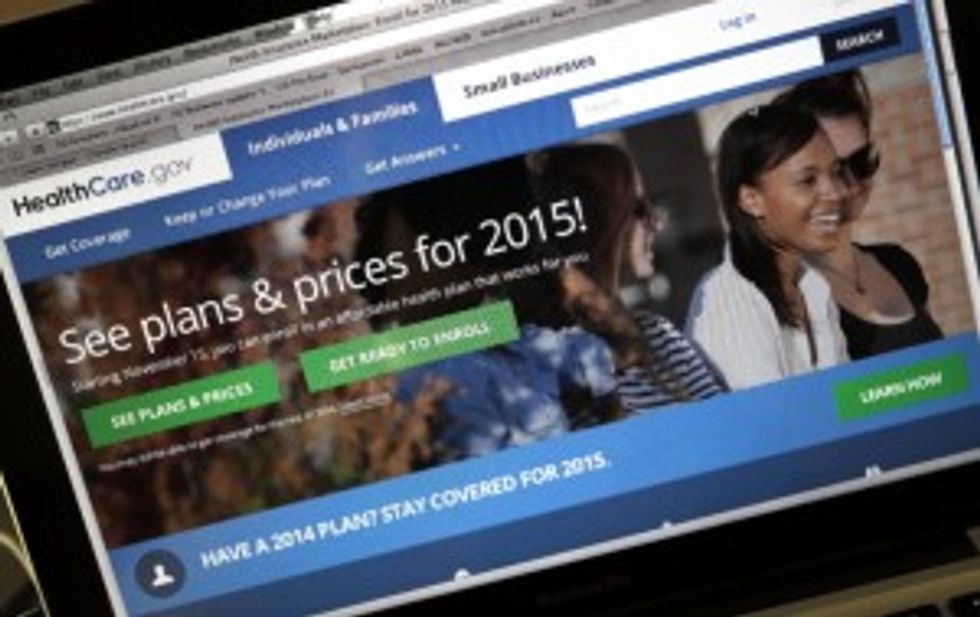
Image source: AP/Don Ryan

It’s the most wonderful time of the year: children franticly open their Christmas gifts, families gather together to share memories and create new ones, and there’s a seemingly never-ending smorgasbord of sugar cookies, pies, and turkey leftovers that make an entire nation fat and happy for the final two weeks of December. With all of this fun, it’s no wonder Americans have fully embraced the tradition of the New Year’s resolution, a time when people take a hard look in the mirror (quite literally) and realize there’s a reason these celebrations come only once a year.
While most Americans’ New Year’s resolution will be to trim waistlines, read more books, or get organized, health insurers, businesses, and pro-liberty Republicans will work to finally end the failed Obamacare debacle that will cause average health insurance premiums to rise by more than 20 percent in 2016.

Insurers Consider Abandoning Obamacare Exchanges
Much progress has already recently been made toward accomplishing that goal. For instance, UnitedHealthcare, the nation’s largest health insurance provider, announced in November it could leave the Obamacare health insurance exchanges in 2017 due to massive costs and failed promises by the Obama administration.
“In recent weeks, growth expectations for individual exchange participation have tempered industrywide, co-operatives have failed, and market data has signaled higher risks and more difficulties while our own claims experience has deteriorated, so we are taking this proactive step,” Stephen J. Hemsley, chief executive officer of UnitedHealth Group, said in a November 19 press release.
Rumors have swirled since Hemsley first made the announcement that other significant health insurance providers could join UnitedHealthcare, possibly leading to an Obamacare death spiral.
The ‘Risk Corridor’ Won’t Protect Insurers
Multi-billion-dollar health insurance companies, virtually all of which once openly advocated for Obamacare, are now rebelling against the program primarily because the Obama administration’s estimates have proven to be wildly incorrect. Too many healthy Americans have been scared away from the Obamacare exchanges because of their high costs, while sicker patients have flooded the marketplace, leaving health insurance companies stuck with ever-larger bills.
Health insurers had been promised that their losses in the early years of the Obamacare program would be offset by the federal government’s imposed “risk corridor,” a complex tax scheme that attempts to divert money away from profitable insurers to cover the losses experienced by other businesses.
Unfortunately for health insurance companies, the risk corridor has been a total disaster because losses have significantly outpaced profits. According to Sean Williams at TheMotleyFool, “Insurers have requested $2.87 billion to help cover excessive losses tied to Obamacare plans, but they’ll be receiving just 12.6% of this amount, or $362 million—a nearly $2.5 billion shortfall.”
Health insurers are losing so much money that many are now thinking it may be better for them to simply choose to lose out on the millions of potential customers in the Obamacare exchanges rather than be forced to take on a disproportionate number of sick customers.
Businesses Fight Against Obamacare ‘Cadillac Tax’
While the nation’s largest insurers consider abandoning the Obamacare exchanges, business associations have been actively lobbying Congress and the Obama administration to delay an Obamacare-created tax on high-priced health insurance plans. The tax, which is commonly referred to as the “Cadillac tax,” essentially punishes businesses who provide generous health insurance benefits.
Proponents of the Cadillac tax say it will only harm the wealthiest employees of massive corporations who receive expensive and allegedly unnecessary health insurance plans. This, however, isn’t true. With only a modest inflationary rate over the next five years, many health insurance plans that do not currently qualify as Cadillac plans would be considered “too expensive,” forcing businesses to reduce benefits for their employees or pay high taxes.
In a study for the Washington Policy Center, Roger Stark writes, “At only a five percent inflation rate, a current individual health insurance plan costing $850 per month and a family plan costing $2,292 per month would qualify as a ‘Cadillac’ plan in 2018.”
Facing significant pressure from businesses, Congress agreed to defer the Cadillac tax for two years, which some say will cost the federal government $9 billion and will deal a significant blow to Obamacare’s long-term viability.
“RILA welcomes the two-year delay of the ACA’s illogical penalty against employers who offer quality health coverage and benefits, but we will continue to press for its full repeal,” Christine Pollack, vice president for government affairs at the Retail Industry Leaders Association, said in a statement. “The 40 percent excise tax threatens the benefits that retailers provide to millions of retail employees and their families.”
Republicans Undermine Obamacare, Seek its Repeal
In addition to the efforts made by Republicans in Congress to delay the Cadillac tax, presidential candidate Sen. Marco Rubio (R-Fla.,) successfully led the charge against the Obama administration’s attempt to divert funding to rescue the risk corridor, and every single prominent Republican presidential candidate has pledged to eliminate Obamacare and replace it with free-market, pro-growth policies—if elected.
For the first time since the Affordable Care Act was passed, health insurers, businesses, and influential politicians are all working together to undermine Obamacare, and if a Republican is elected president in 2016, President Barack Obama’s failed signature legislation could finally be repealed, saving American families thousands each year and improving the quality of care for millions of people.
Justin Haskins (Jhaskins@heartland.org) is editor of The Heartland Institute and of Heartland’s weekly Consumer Power Report.
Justin Haskins